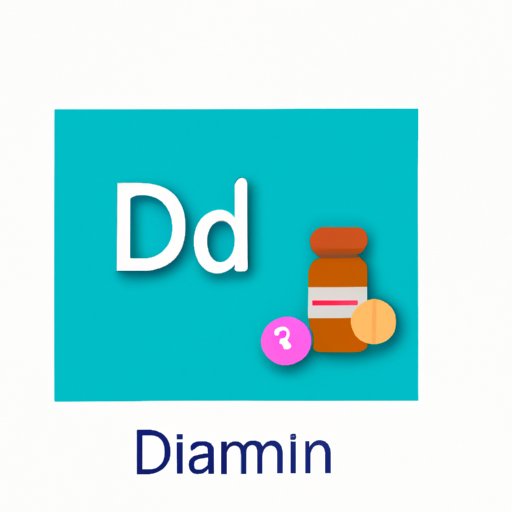
I. Introduction
As a new parent, it’s natural to want to make sure that your baby is getting everything they need to be healthy and happy. One nutrient that is essential for infant health is vitamin D. This is especially important for breastfed infants, as breastmilk alone may not provide enough vitamin D to meet their needs. In this article, we will explore the importance of vitamin D for breastfed infants and provide information and guidance for parents dealing with vitamin D deficiency in their breastfed babies.
II. Benefits of Vitamin D for Breastfed Babies
Vitamin D is essential for infants as it helps to support bone growth and immune function. Specifically, babies need vitamin D to help their bodies absorb calcium and phosphate, two essential nutrients for healthy bone development. Studies have also shown that adequate vitamin D levels in infants may help to reduce the risk of respiratory infections and certain chronic diseases later in life.
Babies need 400 IU of vitamin D per day, but breastmilk alone may not provide enough of this nutrient for infants. While formula-fed babies get vitamin D from the formula, breastfed babies may not be getting enough from breastmilk alone, particularly if the mother is vitamin D deficient. This is why many healthcare providers recommend vitamin D supplementation for breastfed infants.
III. Dietary Sources of Vitamin D for Breastfed Infants
While breastmilk alone may not provide enough vitamin D for infants, there are alternative sources of vitamin D that breastfeeding mothers can consume to ensure that their baby gets enough. Foods like fatty fish, egg yolks, and fortified foods (like some cereals and juices) are good sources of vitamin D.
In addition to diet, sunlight is another way that infants can get vitamin D. It’s important to note that direct sunlight should be avoided for infants under six months of age, but after that time they can spend some time outside (with skin protection) to help their bodies produce vitamin D.
IV. The Risks of Vitamin D Deficiency in Breastfed Babies
Infants who do not get enough vitamin D are at risk for developing rickets, a rare but serious bone disorder that can cause weak bones, delayed growth, and fractures. Vitamin D deficiency in infants has also been linked to an increased risk of infections, including respiratory infections and tuberculosis. Additionally, vitamin D deficiency in infancy has been associated with an increased risk of developing chronic diseases like diabetes, asthma, and multiple sclerosis later in life.
Parents should watch for signs and symptoms of vitamin D deficiency, such as delayed motor development, irritability, muscle weakness, and a sweaty head. If you think your baby may be vitamin D deficient, talk to your pediatrician about testing and supplementation.
V. Supplements for Breastfed Infants
If you are breastfeeding your baby, it may be necessary to give them a vitamin D supplement. There are two types of vitamin D supplements available for infants: drops and multivitamin drops. Vitamin D drops are specifically designed to provide the 400 IU of vitamin D that infants need per day. Multivitamin drops, on the other hand, contain a variety of other vitamins and minerals in addition to vitamin D.
When choosing a vitamin D supplement, look for one that is specifically designed for infants and follow the dosage instructions carefully. Taking too much vitamin D can result in toxicity, so it’s crucial to provide the right amount for your baby’s needs. Always consult with your healthcare provider before giving your infant any vitamin supplements.
VI. The Science behind Vitamin D Supplements for Infants
The American Academy of Pediatrics recommends that infants who are exclusively or partially breastfed receive a supplement of 400 IU/day of vitamin D beginning in the first few days of life and continuing through childhood. Vitamin D drops are the most commonly recommended supplement for breastfed infants. Additionally, studies have shown that vitamin D supplements are safe and effective for improving vitamin D status in breastfed infants.
There are several different types of vitamin D supplements available, including vitamin D2, which is commonly found in vegetarian supplements, and vitamin D3, which is the preferred form as it is the same type of vitamin D made in our bodies when exposed to sunlight. Look for a supplement that contains vitamin D3 and is formulated specifically for infants.

VII. Natural Remedies for Vitamin D Deficiency in Breastfed Infants
In addition to diet and supplements, there are several natural remedies that can help boost your baby’s vitamin D levels. Sunlight is a great source of vitamin D, so try taking your baby outside for a short time each day (with skin protection) to help their body produce vitamin D naturally. It’s also important to ensure that you are getting enough vitamin D yourself, as breastmilk composition is impacted by the mother’s vitamin D status.
In addition, some breastfeeding practices may help your baby get more vitamin D from breastmilk. For instance, feeding your baby more often or for a longer duration may increase the amount of vitamin D they receive from milk. However, it’s important to remember that breastmilk alone may not provide enough vitamin D for your baby, and supplements or fortified foods may still be necessary.
VIII. How to Ensure Your Breastfed Infant Gets Enough Vitamin D
There are several ways that parents can ensure that their breastfed infants get enough vitamin D. For starters, breastfeeding mothers should make sure that they are getting enough vitamin D themselves, either through diet or supplementation. It’s also important to talk to your baby’s healthcare provider about vitamin D supplementation and follow their recommendations for dosage and form.
In addition, parents can encourage safe sun exposure for their babies after they have reached six months of age and during non-peak hours of sunlight. Always make sure that your baby’s skin is protected and avoid prolonged exposure to direct sunlight.
IX. Conclusion
Vitamin D is crucial for infant health, and breastfed infants may not be getting enough of this essential nutrient from breastmilk alone. It’s important for parents to be aware of the risks of vitamin D deficiency and to take steps to ensure that their baby gets enough vitamin D. This can include things like adding vitamin D-rich foods to your diet, encouraging safe sun exposure, and supplementing with vitamin D drops. Remember, always talk to your baby’s healthcare provider before starting any supplements and stay vigilant about your infant’s vitamin D levels.





